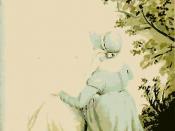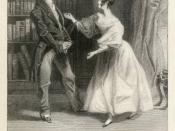Lauren Tully
Elaine Savory
Jane Austen
5/13/10
Comically Ironic
A sense of irony has always been present in Jane Austen's writing, it's a theme that highlighted her novels for two centuries and will continue to make impressions on readers. Pride and Prejudice, like many of the popular novels written by Jane Austen, is seemingly romantic yet incredibly sharp and witty, a story that revolve around relationships, class separation and the politics of love. Although it was not much of a success in Austen's own time, it has grown in its importance to literary critics and readerships over the last two hundred years. There are so many layers to the story that make reading it not only amusing but exceedingly interesting and opened my eyes to her incredible sense of catering to her audience. The reader can learn much about both the upper-class society and the lower-middle class of Austen's time, as well as an insight to Austen's opinion about this society.
Austen presents the high-society of her time from a critical point of view, ironically describing human behavior in the complicated relationships between her characters. Austen as a narrator never seems to be condescending or snubbing in her criticism but applies it in a playful manner with the interactions between her characters. The playfulness of the characters mixed with her witty, ironic comments on society are the reasons that make this novel still so agreeable for contemporary readers. While the novel depicts social rules and character traits that seem old fashioned to the modern reader, the sharp tongue of the many loveable characters in Austen's novels, particularly Pride and Prejudice, captures the hearts of readers from across the times.
Sense and Sensibility
Austen's Sense and Sensibility is known as a novel more wrapped around social politics than plot development. However...


